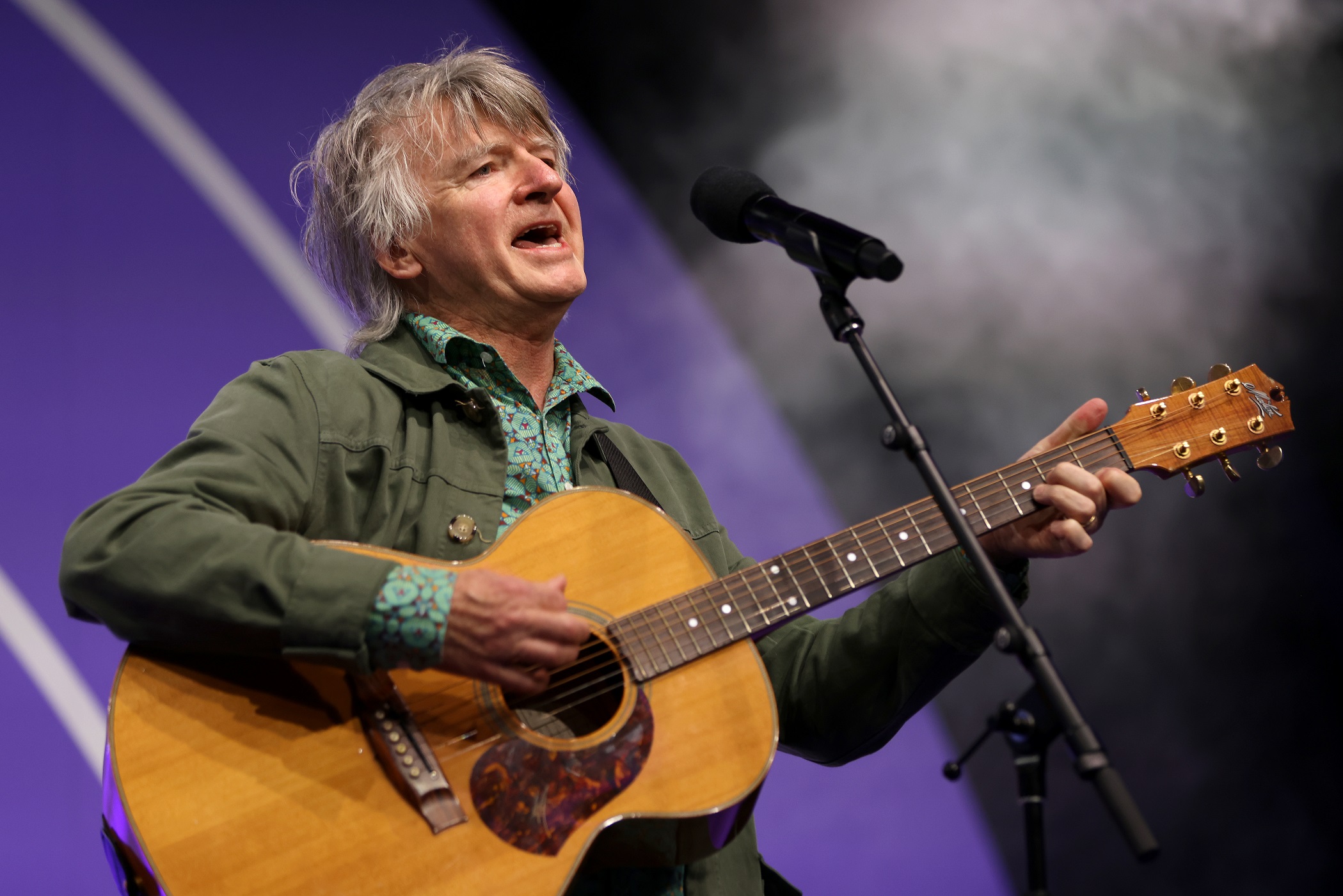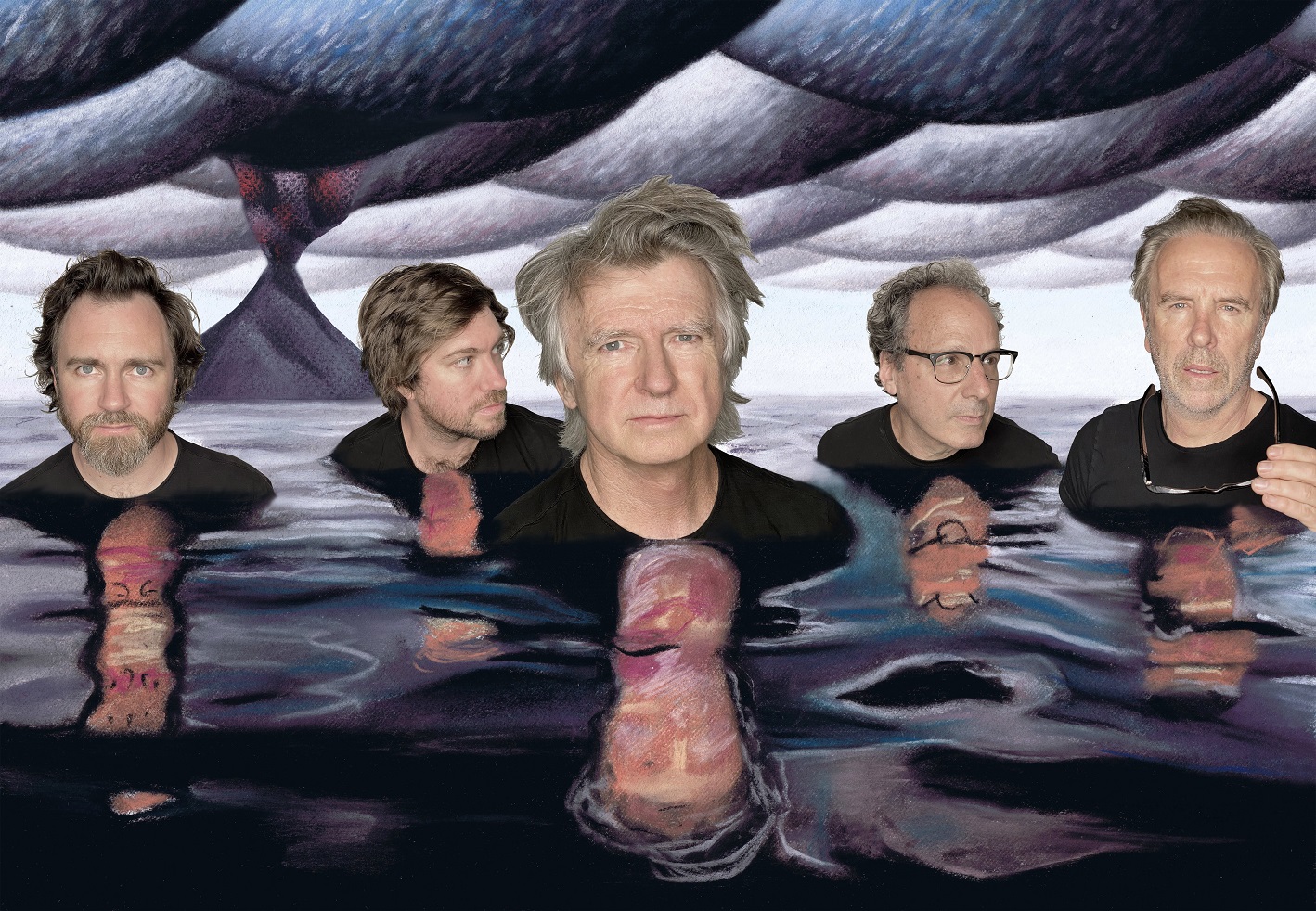
For many years, Crowded House had singer-guitarist Neil Finn and bassist Nick Seymour as their only permanent members, with hired guns coming and going as needed for tours and recording sessions.
But in time, Finn says, a trio of very familiar faces returned again and again. His musician sons Liam and Elroy felt natural on guitar and drums respectively. Mitchell Froom, who produced the beloved band’s 1986 self-titled debut and two follow-up albums, had a long history behind the keyboards in the studio (and co-writing the hit Something So Strong.)
So in 2020, Finn and Seymour made it official, bringing Froom and the younger Finns on board as full members of the band.
"They added more and more to the mix every time we’d work together," Finn says on a recent video call with Elroy Finn and Froom. "So the jump to being in a band together was not a huge one, but it was sort of a statement of intent that we could be a real band.
"It wouldn’t be just on paper a good idea because it was family or something," he says. "It had a sense that the music had gelled on enough occasions we knew there was something strong.
"And particularly with Mitchell included in that," Finn says. "With the depth of knowledge and experience and musical ability that he has, it felt like, wow, that could be a really good lineup and carry the flame quite well in all the right ways for something which has a strong history and spirit to it."
Elroy Finn was born in 1989 after Crowded House had released its first two albums. Though he’s played with Crowded House in the past, becoming a full member feels different.
"The concept had a little bit more gravitas or bit of weight to it," he says. "It was exciting always, but there was, obviously, a big catalogue of music to kind of keep protected and make sure it’s delivered in the right way. ... You know, try to respect all the little details that make those songs special from the past.
"In my mind, that was important to kind of honour those," Elroy Finn says. "Now we’re recording new records it’s just a great opportunity to further the connection that we’ve been building as a family, and musically, and to kind of start pushing that into a few new directions."
"With the help of Mitchell, and obviously the connection we’ve got already with Nick [Seymour], going back so many years, it’s this really familiar, comfortable place for us to be creative," he says.
Froom is best known for his production work on albums by everyone from Paul McCartney and Bob Dylan to Los Lobos and his former wife Suzanne Vega, though he’s also played in bands such as the Latin Playboys and Gamma in the past.

"Like when we get together, it’s not like, ‘OK, let’s go through these old songs’. It’s like, ‘OK, well, what are we going to do now?’," he says. "It’s all about keeping the thing vital, so it remains engaging.
"You know, if you didn’t, if it just felt like an oldies act or something, there’s no way any of us would be interested in doing it. So it’s a band in a pure sense of the word."
Crowded House’s eighth studio album, Gravity Stairs, arrived at the end of May. Neil Finn’s vocals and instinct for a melodic hook links it to the band’s past. But there’s also a dreamy, almost psychedelic sound that’s fresh and new.
"The music falls out in surprising and unexpected ways when I start working," Neil Finn says of the inspiration for the songs on the record. Several were co-written with Liam or Elroy Finn; one is a collaboration with Tim Finn, his brother and former bandmate in Split Enz (and, for a time, in Crowded House, too).
"I don’t sit down with a programme or think I want to write songs about this, that or the other," he says. "Really, it’s just the way I do it. And sometimes I wish I could be more deliberate, but I’m reliant on the subconscious dealing up the first few things. It might be a little demo with atmosphere that creates the song to start with. It might be just a little piano figure that I come up with when I’m jamming.
"Occasionally, there’s a couple of phrases that come along to start with and they’re like an indication of something," Finn says. "They’re little gifts that come along with the original idea. And then you go, ‘OK, what does it mean? What does it suggest? Who’s the person there? Where are they?’."
The feeling of a song might end up mattering more than its story, too, he adds.
"I just make it up and allow it to be pretty loose until the very end, and then the last few words slip together," Finn says of his lyrics. "And in some cases, that doesn’t necessarily mean it’s got a clear narrative or anything. It just means that they, I think, when they work well, they’re suggestive, and they open doorways for people.
"There are literate writers, people who approach it like a literary exercise, and I admire that, but it’s not my way," he says. "I like the melody to be completely married to the words, and sometimes that means the words have to be a little bit abstract in an impressionistic way."
And, he notes, they have to fit whatever stage of life he’s in, too.
"In terms of subject matter, I mean, I want it to be reflective of the time of my life," Finn says. "You know, I can’t be writing — maybe I never did write — songs about, you know, going out and meeting girls and wild misadventures of youth. That would be particularly inappropriate now. I think I just rely on the subconscious."

"All the work that went into making the record, and countless hours spent micro-focusing on something, it pays off when you get to this point and you get into the rehearsal room," Elroy Finn says. "The arrangement of these songs are well thought out at that point, and everyone vaguely knows what they’re doing.
"There may be certain songs that, you know, require a little bit of reimagining or rethinking," he says. "Maybe it’s going to be better stripped back. But overall, with the new record, at least, it felt like we had done a lot of hard work, and by the time it got into the rehearsal room there’s a sense of confidence in there, and it puts the song across a little quicker."
For Froom, hours in the studio playing as a band, not isolated musicians laying down tracks by themselves, have honed the group’s live chops.
"The essence of the way that the song feels is based on a live performance," Froom says. "So if you present just that live, we’re pretty much there. Then there’s a lot of ornamentation that works just fine to scale back a little. Between all of us, we can make so many different kinds of sounds and noises that it doesn’t take that much.
"It’s all ready when we first play it in the studio and get the track and then have the vocal on it," he says. "That’s kind of all the important stuff. The other stuff is just detail."
Some of the work behind the scenes goes into finding the right balance to present songs as fans want to hear them while not overwhelming them with the power of live music.
"I think sonically, tones and instruments sound a bit better when they’re not played too hard," Elroy Finn says. "So when you’re putting a quiet, collective group of instruments off the stage through a big, loud PA, it’s generally a pretty gratifying result.
"There is an instinctive thing where you want to naturally play something louder and harder because you’re in a big room," he says. "So you’ve got to kind of repress those urges, or those first thoughts to make something loud. To hit the drums louder because you’re in a big room, it’s genuinely the wrong idea.
"Unless you’re Mick Fleetwood," adds Neil Finn, who filled in on guitar and vocals with Fleetwood Mac after Lindsey Buckingham’s departure.
"Unless you’re Mick Fleetwood," Elroy Finn agrees. "Then you play drums loud all the time and it sounds like him." — TCA
Tickets to the gig
• We have two double passes to Crowded House’s Dunedin show on November 12 to give away. To go in the draw, email your name, address and daytime phone number to playtime@odt.co.nz, with "Crowded House" in the subject line.











